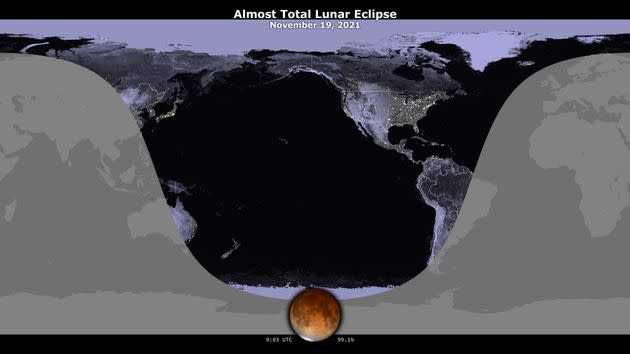Partial Lunar Eclipse Starts Around 1 a.m. Eastern And Will Be Around For Hours
Late Thursday night and into the wee hours of Friday morning, moongazers will behold a rare astronomical event: The longest partial lunar eclipse in 580 years.
For about 3 hours and 28 minutes, the moon will be almost completely eclipsed by the umbra, or the deepest part of the Earth’s shadow, although the eclipse will last more than six hours in total once it begins around 1:02 a.m. Eastern time. There won’t be a noticeable shift in color for about an hour, and the eclipse will peak several hours later, at 4:03 a.m. Eastern.
Moongazers unite! The longest partial lunar eclipse of this century will occur overnight, peaking early Nov. 19 at 4:03am ET (09:03 UTC).
Find out what parts of the world will be able to see it: https://t.co/wEuWtoZCMlpic.twitter.com/xtXjwbgvnl— NASA (@NASA) November 18, 2021
The event won’t be a full lunar eclipse, but it’s pretty darn close, as up to 99.1% of the moon will be covered at its peak, NASA said. The surface will likely take on a blood-red or orange cast at times (this isn’t a proper “blood moon” event), aside from a small sliver on the bottom that will remain pearlescent. The moon is also being called the Beaver moon.
The lunar spectacle will be visible across large parts of the world, including North America, eastern Australia, northern South America and parts of northeastern Asia. No special glasses are needed, as in the case of solar eclipses, so wannabe astronomers just need to wake up and look up late at night, ideally with clear skies.

NASA said this eclipse is notably long for two main reasons: The moon is almost at its fartherest point in its orbit around Earth and, therefore, moves slowly through the shadow. And because it’s an almost total eclipse, the moon spends more time in the shadow than in a lesser eclipse.
It’s the second lunar eclipse of the year after one in May that was also a super moon, and the next one will take place in May 2022. The next total solar eclipse won’t take place until 2024.
This article originally appeared on HuffPost and has been updated.




